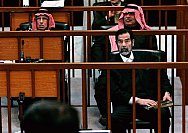
BAGHDAD, Iraq Nov 27, 2006 (AP)— An Iraqi Kurd who said he survived a firing squad of Saddam Hussein's soldiers testified Monday in the former dictator's genocide trial, describing the day nearly two decades ago when he watched as his mother and sisters were shot to death.

Kurd Testifies at Saddam Trial That He Watched As His Mother and Sisters Were Shot to Death
Then 12 years old, Taimor Abdallah Rokhzai said he, his family, eight female cousins and Kurdish villagers were taken to a desert execution site.
"There was a trench. We were lined up. A soldier shot directly at us. I was hit on my shoulder," Rokhzai, now 30, said at the trial of Saddam and six former members of his regime, which resumed after a 19-day break.
Saddam and his co-defendants pleaded innocent to charges of war crimes and crimes against humanity arising from their role in a military crackdown on Iraq's Kurd population in 1987-88.
"The soldier kept firing at us. I saw my mother's head scarf fall, my sisters and relatives were bleeding, and then they all died," Rokhzai told the court.
Saddam and his co-defendants sat quietly during the testimony.
Rokhzai, who now lives in Washington, said that during the shooting, "I begged the soldier 'We are women and children. Why are you shooting us?'" He did not say how the soldier reacted.
"I saw bullets hitting a woman's head and her brain coming out, I saw a pregnant woman shot and killed. It was horrible," he said, recalling the 1988 event through a Kurdish-Arabic interpreter.
"The shooting suddenly stopped. It was quiet. I was waiting to die. My whole body was covered with blood. The soldiers then went away. They were talking among themselves. I wanted to go to out from the trench. But a little girl asked me where I was going. I don't know her name but she was alive," he said.
Rokhzai said the girl was not wounded but she refused to come with him as he left the trench. As he walked away, he said, he passed many trenches filled with bodies.
He kept walking, and that night he saw a tent with a light; the person inside sheltered him. He said he remained in hiding, moving from one village to another in northern Iraq, until 1991 when the Kurdish autonomous zone was established under the protection of U.S. and British forces.
The prosecution says that about 180,000 people, mostly civilians, were killed in the campaign against the Kurds, code named Operation Anfal.
Saddam and one other defendant have pleaded innocent to the additional charge of genocide.
The former dictator and most of the defendants were represented by court-appointed lawyers as defense counsel have been boycotting the trial for two months in protest against the court's refusal to give them more preparation time and other rulings.
Yacoub reported from Baghdad and Halaby from Amman, Jordan. Some material in the story came from a pool report at the trial in Baghdad.
Copyright 2006 The Associated Press. All rights reserved. This material may not be published, broadcast, rewritten, or redistributed.


